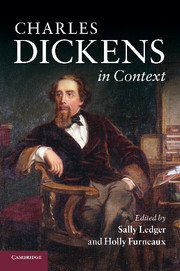Book contents
- Frontmatter
- Contents
- List of illustrations
- Notes on contributors
- Preface
- Notes on references
- PART I LIFE AND AFTERLIFE
- 1 The life of Dickens 1: before Ellen Ternan
- 2 The life of Dickens 2: after Ellen Ternan
- 3 Dickens's lives
- 4 Victorian stage adaptations and novel appropriations
- 5 Reviewing Dickens in the Victorian periodical press
- 6 The European context
- 7 Major twentieth-century critical responses
- 8 Modern stage adaptations
- 9 Modern screen adaptations
- 10 The heritage industry
- 11 Neo-Victorian Dickens
- PART II SOCIAL AND CULTURAL CONTEXTS
- Further reading
- Index
6 - The European context
Published online by Cambridge University Press: 05 August 2012
- Frontmatter
- Contents
- List of illustrations
- Notes on contributors
- Preface
- Notes on references
- PART I LIFE AND AFTERLIFE
- 1 The life of Dickens 1: before Ellen Ternan
- 2 The life of Dickens 2: after Ellen Ternan
- 3 Dickens's lives
- 4 Victorian stage adaptations and novel appropriations
- 5 Reviewing Dickens in the Victorian periodical press
- 6 The European context
- 7 Major twentieth-century critical responses
- 8 Modern stage adaptations
- 9 Modern screen adaptations
- 10 The heritage industry
- 11 Neo-Victorian Dickens
- PART II SOCIAL AND CULTURAL CONTEXTS
- Further reading
- Index
Summary
This chapter challenges the assumption that Dickens belongs in some exclusive way to Anglo-Saxons by opening a window on to the enormous quantity of European writing that unmistakably acknowledges him as its master. I start by querying another commonplace – championed by no less authoritative a Dickensian than Philip Collins – that Dickens was profoundly English, with what George Augusta Sala calls ‘a good-humoured contempt of foreigners’. This is surely hard to square with such things as Dickens's ceaseless activity in promoting various foreign national independence struggles in Europe, or the trouble he took to become proficient in French and Italian. It seems particularly untrue of his relations with Italy, which clearly go beyond intense political engagement on behalf of the movement for Italian unification, the Risorgimento. After an initial period of generalised revulsion, Dickens quickly began to practise a sharp distinction between disgust at the deplorable social and political conditions of Italy and love of its people, not dissimilar to a later formula about Britain itself: ‘My faith in the people governing is, on the whole, infinitesimal; my faith in The People governed is, on the whole, illimitable.’ ‘Give me the smiling face of the attendant, man or woman; the courteous manner; the amiable desire to please and to be pleased; the light-hearted, pleasant, simple air – so many jewels set in dirt – and I am theirs again to-morrow!’ he writes in Italy, and later in London confesses a compulsion to ‘talk to all the Italian boys who go about the streets with Organs and white mice, and give them mints of money per l'amore della bell'Italia’.
- Type
- Chapter
- Information
- Charles Dickens in Context , pp. 43 - 50Publisher: Cambridge University PressPrint publication year: 2011
- 1
- Cited by

